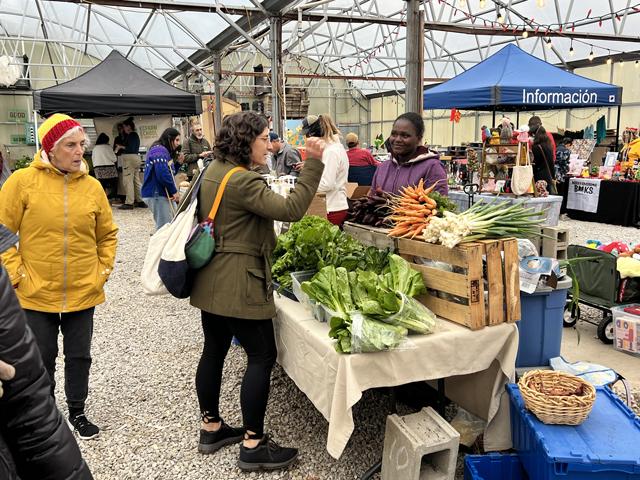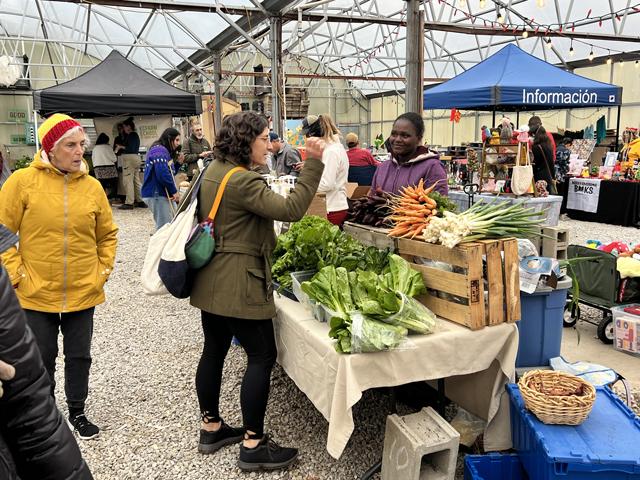Ag Policy Blog
An Inner-City Farm School Shows How the Farm Bill Helps Develop Urban Ag
KANSAS CITY, Kan. (DTN) -- At a holiday market Monday, the KC Farm School at Gibbs Road hosted about 20 vendors selling beauty aids, teas and soap, but also fresh produce, baked items and some meat and eggs. As people shopped, the farm school also offered information about using various federal and state food aid programs.
Carolyn Tragasz, a member of the KC Farm School crew, showed off some of the greens for sale, including Swiss chard, arugula, rosemary, mint and sage, spices, turnips, garlic, tomatoes and a leafy green called tatsoi, which she explained to a visitor.
"That's another thing I love about the market is I see something new to try," Tragasz said, as the visitor tries to Google "tot-soy."
Within the two-state Kansas City metro area, the city of Kansas City, Kansas, has the highest poverty rate in the metro at 18.6%, significantly higher than the national average. Tragasz noted a statistic from a workshop that Wyandotte County, where Kansas City, Kansas, is, has the poorest health outcomes -- the impact of health services or intervention -- of any county in the state.
"For me, it's important we are doing this in a county where we can help improve the health outcomes," Tragasz said.
URBAN AG AND FARM POLICY
The farm property at KC Farm School at Gibbs Road goes back decades with different owners and leaders. The farm school and its programs also reflect how urban agriculture has evolved in recent years.
As programs from the 2018 farm bill have developed, more urban and alternative farms are tapping into the farm bill's food aid or various grant programs to help improve food availability, often in low-income neighborhoods.
Jennifer Thomas, co-founder and resource director for the KC Farm School, explained that each food aid program has slightly different rules about who qualifies and which products consumers can buy. If a shopper doesn't fit into the government acronyms -- SNAP, WIC or KSFMNP -- the farm school also has the option for people in the community to pay what they can afford.
"We just try to promote that we accept all of these programs, but if you aren't enrolled in any of them, we have the pay-what-you-can option as well," Thomas said.
A high school and middle-school teacher, Thomas also has become the farm school's grant program writer. "I didn't even know I was a grant writer," she said. "There was a lot I had to figure out along the way."
But her skills have improved and the KC Farm School has gotten more recognition and funding in the process. In September, USDA's National Institute of Food and Agriculture (NIFA) awarded the KC Farm School and the Kansas City Black Urban Farmers Inc. with a three-year $748,000 Beginning Farmer and Rancher Development Program grant. That came after a $299,000 grant in 2021 under USDA's Urban Agriculture and Innovative Productions grant program.
New avenues of state and federal funding have helped various urban farming programs broaden their reach in recent years. A valuable resource is having people like Thomas who learn to navigate the process to apply for funds and programs. While urban farming and community gardens are growing, though, not everyone has grant-writing skills.
"The biggest issue is having the capacity to unlock some of these programs," said Rodger Cooley, executive director of the Chicago Food Policy Council.
Cooley was part of a group of largely urban farm organizations last week at an agriculture and climate summit in Nebraska hosted by the RE-AMP Network. Talks included looking at various farm bill programs and bills to support and help boost funding for urban agriculture.
COMMUNITY WORKSHOPS
Earlier this month, the farm school hosted a daylong workshop of beginning gardeners as part of the farm's "Let's Grow Wyandotte" project.
P[L1] D[0x0] M[300x250] OOP[F] ADUNIT[] T[]
"The idea is we share what we have so people can have what they need," said Alicia Ellingsworth, co-founder and executive director of the farm school.
She said a fundamental principle in the urban area is showing others it doesn't take a lot of space to start growing their own food. Ellingsworth noted the farm school typically grows about 20,000 pounds of food on less than an acre of cultivated land,
"If folks who have never gardened before, it's amazing to see how their faces open up," Ellingsworth said. "And if you do garden, you know that you fall in love with that land and that soil."
About 80 people were there for the community day, including Ashley and Phillip Scott, who were taking some steps to learn how to be more productive gardeners. The couple had recently moved back across the Missouri River into Kansas but saw they had some problems getting access to food during the COVID-19 pandemic.
"When COVID happened, it was a wake-up call," said Ashley Scott. "People had a lot of issues. If you relied on grocery stores to buy all of your food, you didn't have any."
The Saturday workshop included some instruction on small-scale urban farming from an adjunct professor of sustainable agriculture at Johnson County Community College (JCCC). Claire Zimmerman runs a nearly 2.5-acre farm at JCCC and her family recently bought a small farm in a neighboring county. Zimmerman highlighted the rationale for buying certain gardening tools such as a precision seeder.
"It's going to save time, it's going to save energy or it's going to save money," she said.
Another critical element Zimmerman highlighted is developing a production plan that will help with succession cropping or intercropping a plot of land. She also shared information from Kansas State University's (KSU) vegetable and garden planting guide, spelling out the appropriate time and conditions to grow certain seeds.
"When you plant a vegetable, you need to think about how long it is going to be in the ground and what you expect to follow it," she said. "That's your production plan."
Erica Bush, a member of the farm crew and an urban farmer for about 13 years in the Kansas City area, said the farm school fills a large gap in the community because there are people who visit it daily.
"They have produce in the winter and they do a lot of different things in the summer such as activities," Bush said. "So, when you want to be able to get a tomato that lasts longer than three days or you need fresh food in this area, it's essential. We also offer eggs, honey, meat and milk, other things like that too. So, if you can get there, then you can help almost all your needs at one time."
PAY WHAT YOU'RE ABLE
Over the past five years, the farm school and its farmers market have enrolled in taking payment from the Supplemental Nutrition Assistance Program (SNAP), the Double Up Food Bucks program for farmers markets, the Women, Infant and Children (WIC) program and the Kansas Senior Farmers Market Nutrition Program, also funded by USDA. Each has a little different clientele, but all are growing in use. Almost none of those programs were allowed to be tapped nationally by farmer markets or community farm programs before the 2018 farm bill.
There remain some food and nutrition needs, however, among area residents that go against the argument of cutting SNAP, which is a constant point of contention every time the farm bill is reauthorized.
"They really need to make it where more people are eligible because we really do catch those people who are not able to qualify for SNAP," Thomas said.
To fill an added need, the farm school also started a "pay what you're able" option. There were initially some concerns over whether the school would start to hemorrhage funds, but Thomas said an initial grant of $10,000 proved to be twice the actual revenue losses.
"We've proven it works without hurting us too much," Thomas said. "We also now have people come back when they are doing better and pay more."
LEARNING AND TEACHING
Beyond their own produce, the KC Farm School hosted several other area farmers at Monday's sale. Susan Welsh, a retired pastry chef, has taken on a second career developing Grasshopper Urban Farm on 1-1/2 acres. Her family bought the land in 2019 after she went through KSU's Growing Growers workshops and apprenticeship program.
"When I was younger, you didn't see the possibility of urban farming or having a small organic farm," Welsh said. With concerns about pesticides and sourcing foods, "people are starting to want to know who their farmer is."
Welsh also is participating in the farm school's grant to teach other beginning farmers. The structure of the grant is that it will provide funds to both the mentor farmers and those who are enrolled to learn.
"We're going to be teaching each other. After all, we're all still beginning farmers," Welsh said. "It's hard, hard work and you have to have a passion for it."
Also selling produce Monday was Mediatrice Niyonkuru, a refugee originally from Burundi who has been in the United States since 2014. She learned farming through New Roots, a Catholic Charities program in the Kansas City area. Niyonkuru typically sells her vegetables at a few farmers markets in the metro area.
"They teach us and help us, but we do everything for ourselves," Niyonkuru said about the New Roots program. "I'm able to grow and still make money while I watch my children at home."
Gabe Diaz, 15, has been among the KC Farm School's apprentices for the past couple of years and told DTN he's looking forward to turning 16 so he can become a more official part of the "farm crew." He said he got involved with the farm when his middle school began making regular visits. Because of his work at the farm school, Diaz said he wants to go to KSU to study agricultural marketing.
"I love that they are here for the community and not just out to make money," Diaz said.
Asked what he's learned most about farming, he replied, "Patience. You have to have patience to learn how everything grows."
Also see, www.kcfarmschool.org
Also see: Alicia Ellingsworth talks to DTN about the KC Farm School and how it has developed over the years. https://www.dtnpf.com/…
Chris Clayton can be reached at Chris.Clayton@dtn.com
Follow him on X, formerly known as Twitter, @ChrisClaytonDTN
(c) Copyright 2023 DTN, LLC. All rights reserved.






Comments
To comment, please Log In or Join our Community .